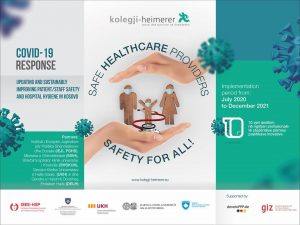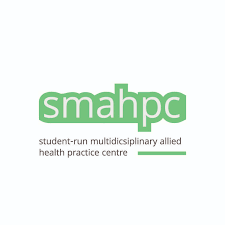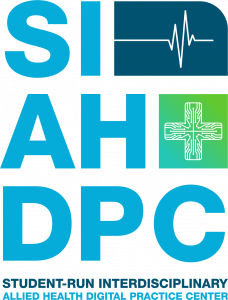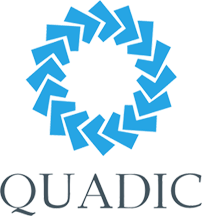Projects
1
Student-run Multidisciplinary Allied Health Practice Center (SMAHPC)
Student-run Multidisciplinary Allied Health Practice Center (SMAHPC) -project addresses the need for better health and rehabilitation services in Kosovo through development of new operating models and competences for multidisciplinary health center. The aim of this project is to establish and functioning a student-run center in Kosovo that provides easy access services for Kosovar people but also new kind of learning environment for students in Kosovo.
This project addresses the great need for qualified health/rehabilitation in Kosovo. The relatively poor level of quality and efficiency of health services in general in Kosovo represents an issue that is insufficiently and inadequately addressed by the current national programs, strategies and macro-policies.
The Institute of Southeast Europe for Health and Social Policy is one of the partners in the implementation process of this project. The ISEE-HSP’s main role in project is focused in the work package number 4: Quality Assurance.
2
Student-run interdisciplinary allied health digital practice centre (SIAHDPC)
Student-run interdisciplinary allied health digital practice centre (SIAHDPC) is an Erasmus + Capacity Building in Higher Education project, led by University Heimerer College in Prishtina, Kosovo. The aim of this project is to enhance the virtual and mixed reality practice-oriented education in allied health sciences through lifelong-learning (LLL), in line with the Bologna process and in collaboration with rehabilitation/health providers, ministries and national industry.
As a joint national project, it addresses the relevant thematic national priorities in multiple direct, innovative and sustainable ways. The project contributes to improving management and operation of Higher Education Institutions in terms of developing additional capacities for research, entrepreneurship and innovation, excluding research activities, aims to develop evidence-informed practice competences through training and learning materials for the Kosovo HEI staff and students, primarily. The project contributes to the development and updating the relevant curricula in the area of health with interdisciplinarity as the central point.
The Institute of Southeast Europe for Health and Social Policy in this project is involved as an active partner, leading the work package no.1 (The Handbook of Key Concepts for establishing and operationalizing the first digital environment in health care in Kosovo) as well as contributing on the package no.6 (Dissemination).
3
Strategic Innovative Educational Network for Healthy Ageing (SIENHA)
Strategic Innovative Educational Network for Healthy Ageing – SIENHA is a project funded by ERASMUS + in building intellectual capacities, with the aiming to develop a new framework for higher education in healthy ageing education that allows the implementation of novel and systemic programs for professionals who will be promoting it soon.
The vision of Strategic Innovative Educational Network for Healthy Ageing project is to increase the understanding of healthy ageing as a lifetime process requiring increased attention at all phases of life, continuous development of competences of students, teachers and professionals to foster Healthy Ageing internationally, the development of new innovations and methods and to the use of digitalization to raise the importance of health promotion across Europe, the development of applied research internationally, and to the effective transfer of theory in practice, exchange of knowledge across European social and health care sectors to develop quality practices in Healthy Ageing, and the increase of knowledge of citizens to support their personal health at all ages.
The Institute of Southeast Europe for Health and Social Policy is involved as a partially partner, mainly focused on the research part of the project.
4
Erasmus for Young Entrepreneurs (EEE)
Erasmus for Young Entrepreneurs is an EU-funded exchange programme for entrepreneurs residing in the 39 participating countries. It is not linked to age or nationality. The exchanges last 1-6 months for new entrepreneurs (NE) with experienced host entrepreneurs (HE) abroad. It is a good opportunity to exchange knowledge, business ideas, contacts, and experiences. Financial support is provided by the programme for the stay abroad (amount depends on the destination and length of exchange).
The general objective of the Erasmus for Young Entrepreneurs programme is to help European entrepreneurs enrich their experiences, through learning and networking, and by spending periods of time in enterprises run by experienced entrepreneurs in other countries. It furthermore aims to enhance entrepreneurship, internationalization and competitiveness of new and established micro and small enterprises within the EU and in other participating countries. Erasmus for Young Entrepreneurs is about breaking barriers and crossing borders.
The Institute of Southeast Europe for Health and Social Policy is involved as an active partner. Institute is supporting in terms of research, training and mentoring group of students that will be part of this project when seeking help for developing their business ideas.
5
Building Capacity Through Social Innovation Towards Improving and Sustaining Health and Well-Being in Communities (SUSWELL)
SUSWELL is an EU funded project that aims to modernize health curricula of higher education institutes (HEI) from Pristina, Gjakova, Perm, St. Petersburg and Belgorod. This project addresses capacity building through social innovation in order to improve and sustain health and well-being at community level in Kosovo and Russia.
The aim of the project is: to build increased institutional capacity of the involved higher education institutes, to enhance individual capacity of (future) health professionals, to reach greater social capacity in the targeted local communities in Kosovo and Russia.
The Institute of Southeast Europe for Health and Social Policy is involved as a partially partner, specific in research needs.
6
Quality Development of International Cooperation and Project Management (QUADIC)
Quality Development of International Cooperation and Project Management (QUADIC) it’s a project funded by ERASMUS + with the purpose of building institutional capacity in project objectives and addressing the lack of quality for international cooperation and lack of project initiatives from Kosovo and Albania universities.
The overall goal is to improve higher education provision in Kosovo and Albania by building institutional capacity for international relations, thereby establishing or making fully functional respective offices in all consortium members.
The Institute of Southeast Europe for Health and Social Policy is involved as a partially partner.
7
COVID-19/ Response Project
Kosovo’s hospitals and clinics are insufficiently prepared, both in terms of know-how and equipment, to contain Covid-19. The present project will make a significant contribution to remedying this deficit and bringing the country’s health care system up to speed with cutting edge standards in hygiene research and patient/employee safety. Kosovar health personnel will be helped to respond to the special requirements of hygienic work through online guidance, instruction, and training. At the same time, the latest insights of the research into hygiene regulations relating to the corona virus and patient safety, are provided quickly and reliably to transfer this specialist know-how immediately and sustainably into hospital routines. A further goal is to train health professionals in hygiene and patient/employee safety. With a continuous improvement process, hygiene management and patient/employee safety are nationally anchored as quality criteria in health care. This training will be based at the Heimerer College.
The Institute of Southeast Europe for Health and Social Policy is involved as an active partner, leading the work package no.4 (Dissemination). The institute has already fulfilled its responsibilities in creating a dissemination plan by building the website in terms of infrastructure as well as content wise (which will be published soon). Moreover, it was required also that Institute take the lead on two research studies that are foreseen in the project.







